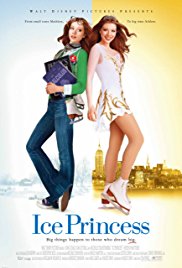1. Click here for Standard Questions Suitable for Any Film.
2. What does this movie say to us about cliques in school?
Suggested Response:
That they are artificial separations. Casey is classified as a geek at the beginning of the movie but it turns out that she has this hidden talent for beautiful ice skating.
3. This movie has been criticized for spreading stereotypes, particularly the stereotypes that a girl must be beautiful and graceful and not concerned with science or professional accomplishments and the stereotype that, while ice skating is difficult and requires work and discipline, it is still a “girl” thing to do.
Suggested Response:
This is a fair criticism of the film.
4. There are at least two subplots in this movie. Describe the main plot and the two subplots. Suggested Response: The main plot is the story about how Casey becomes a regional finalist figure skater and puts her relationship with her mother on a firmer footing. The subplots are the story of the relationship between Gen and Tina and the romance between Casey and Teddy.
5. Is the world of competitive figure skating as tough as shown in the movie?
Suggested Response:
It is, although hopefully, people don’t cheat. In 1994, a former U.S. figure skating champion, Tonya Harding, and her ex-husband conspired to attack Nancy Kerrigan, a competitor at the Olympic trials. Harding was prosecuted and pled guilty. She was stripped of her title. Kerrigan recovered in time to skate in the Olympics and won a Silver Medal.
6. Did Casey do the right thing by asking Tina to be her coach?
Suggested Response:
Tina was the only coach around. By that time, Gen had stopped skating and Casey could be assured of Tina’s loyalty. Casey knew Tina’s limitations and felt that she could deal with them.
7. Who was the most admirable character in this movie?
Suggested Response:
There are two possibilities, Casey and Gen. Casey is an obvious choice. She was driven to accomplish something and did it. She was nice to everyone and, other than lying to her mother to spare her mother’s feelings, she did nothing wrong. Gen is also a good choice. While she lied once to her mother about going to a party, she acted well in every other situation. She was a true friend and a good daughter. Gen was appalled when her mother torpedoed Casey’s performance with the new skates. Gen forgave her mother. (Sometimes being a good child means forgiving a parent who does something wrong.)
8. After Gen had stopped skating, Casey forgave Tina and asked Tina to be her coach. Should she have done this? What was the risk Casey had to guard against if Tina was her coach?
Suggested Response:
There is no one correct answer to this question. Tina had a tendency to cheat when faced with a difficult competition. She had repeated this mistake after having been caught and severely punished when she was a skater. If she cheated for Casey it would reflect poorly on Casey and Casey might even get disqualified. However, Casey needed a coach and Tina was the only one around. Then again, some people do learn from their mistakes and reform. See, for example, the story of the coach in Cool Runnings.


